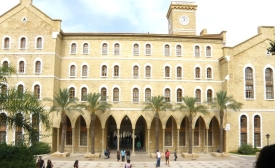universities

American universities abroad can advance U.S. geopolitical interests, but must also appear disinterested to remain credible in their local contexts–a difficult needle to thread.

CPD Dissertation Grantee Kyle Long is featured in a new book on the globalization of American liberal arts education.
Just as many universities believed that the financial wreckage left by the 2008 recession was behind them, campuses across the country have been forced to make new rounds of cuts, this time brought on, in large part, by a loss of international students. Schools in the Midwest have been particularly hard hit — many of them non-flagship public universities that had come to rely heavily on tuition from foreign students, who generally pay more than in-state students.

New forms of international relations, where knowledge diplomacy is a significant soft power tool, are being shaped.

According to the 2017 Open Doors report, USC ranks second in terms of universities that host the most international students.
The University of Denver says it wants to play a bigger role in world events and is kickstarting those efforts by giving former ambassador to Iraq Christopher R. Hill a new job. Hill, dean of DU’s Josef Korbel School of International Studies for the past seven years, on Tuesday was named chief adviser to the chancellor for global engagement and professor of the practice of diplomacy, a first-of-its-kind role for a major American university, school officials said.







